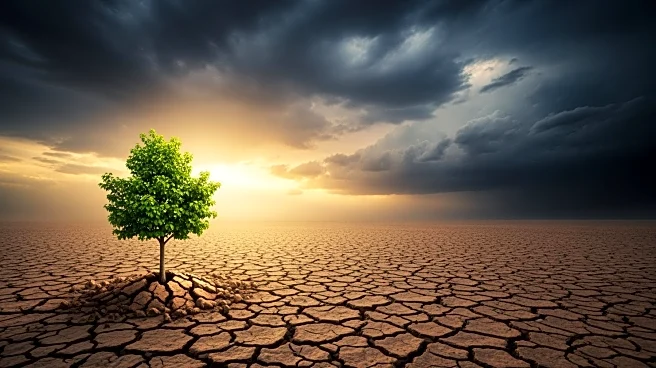What's Happening?
The Punjab chief minister has attended COP30 in Brazil, emphasizing Pakistan's climate vulnerabilities and the need for international collaboration. Pakistan, a signatory to the Paris Agreement, has submitted
its third Nationally Determined Contribution, aiming for a 50% reduction in greenhouse gases by 2035. The conference focuses on transforming agriculture and food systems, crucial for Pakistan's political economy and rural development. The country faces significant food insecurity due to climate change impacts like droughts and floods, affecting over 40% of its population. Pakistan contributes less than 1% to global greenhouse gases but is among the top 10 climate-vulnerable countries.
Why It's Important?
Pakistan's participation in COP30 underscores the urgent need for climate action and international support. The country's agriculture sector, vital for its economy, is threatened by climate change, impacting food security and livelihoods. The conference provides a platform for Pakistan to seek global partnerships and funding to address these challenges. The focus on agriculture and food systems is critical, as Pakistan's rural development and economic stability depend on these sectors. The event highlights the importance of climate adaptation strategies to protect vulnerable communities and promote sustainable development.
What's Next?
Pakistan aims to operationalize COP commitments, focusing on renewable energy, ecosystem stewardship, and resilient cities. The country plans to enhance climate-smart agriculture practices and improve water-food-climate nexus management. International financing, technology transfer, and capacity building are essential for achieving these goals. Pakistan's initiatives, like the Ten Billion Tree Tsunami Programme and Clean and Green Punjab, will continue to play a role in mitigating climate impacts. The government seeks to strengthen regional and global partnerships to support its climate action efforts.
Beyond the Headlines
The COP30 discussions may lead to long-term shifts in global climate policy, influencing Pakistan's approach to climate adaptation and resilience. The focus on climate justice and financing could result in increased support for developing countries like Pakistan. The event highlights the ethical dimensions of climate change, emphasizing the need for equitable solutions that address the disproportionate impacts on vulnerable populations. Pakistan's efforts to integrate climate considerations into its development plans could serve as a model for other countries facing similar challenges.









